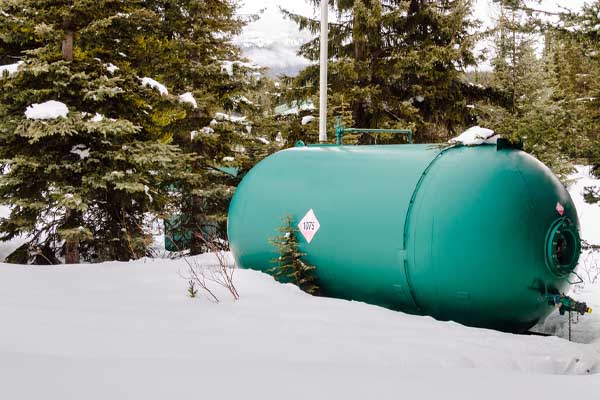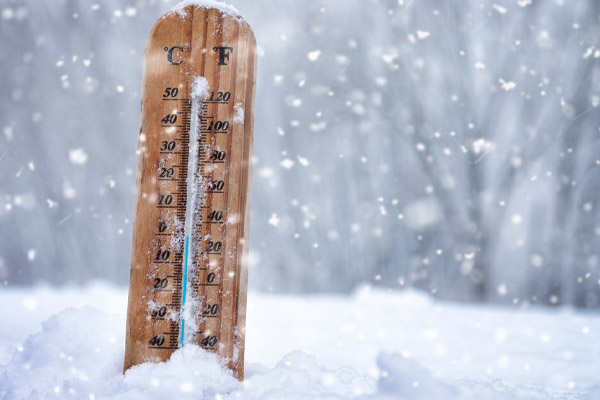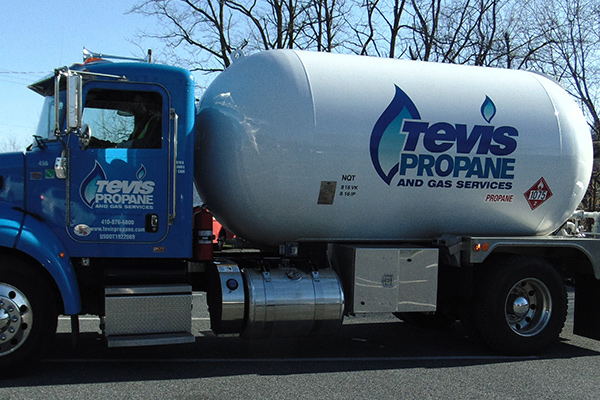Contents
Propane is a reliable source of clean energy. Compared to alternative sources of energy, using propane for heating results in less carbon monoxide being released into the atmosphere. This makes it a good option for those who live in remote areas or homes without easy access to energy sources.
Homeowners may, however, be hesitant to use propane due to worries that it will freeze in cold weather, especially during winter. That begs the question, does propane freeze?
In this post, we’re going to be looking at propane, whether it freezes in cold weather, what you should do in such a situation, and basically address any concerns you may have over frozen propane. Let’s dive in:
Should I Be Concerned That My Propane Might Freeze?

Frozen propane is quite uncommon. As such, we hardly ever hear about this kind of problem from any of our customers. But that doesn’t mean that harsh winters or cold snaps have no impact on propane supply, they do.
That’s why we consider cold weather to be a problem other than frozen propane. It might have an unanticipated knock-on impact on homeowners, which will be explained in detail as we proceed.
Related Article: What Are Degree Days?
At What Point Does Propane Freeze?

The freezing point of propane comes up in a lot of conversations, which explains why most people tend to pay attention to it. Propane has a freezing point of -187.7 degrees Celsius, or -306.4 degrees Fahrenheit. Regardless of how or where propane is stored, this freezing point is constant.
Most times, when people think about this freezing point, they are worried that their fuel will turn into a solid form during cooler months. That means that their fuel won’t flow from a propane tank through to their homes, a propane grill, or a backup generator, which leaves them helpless.
Well, we’ve got to assure you that this won’t be a problem. The freezing point is not usually a problem, but the propane boiling point may be, which is where folks start to lose the plot a little bit.
What Matters with Propane Is Its Boiling Point, Not Its Freezing Point
Propane boils at -42 degrees Celsius, or -43.6 degrees Fahrenheit. Again, regardless of the storage location or conditions, the boiling point remains constant. This is what you need to be concerned about because you don’t want the temperature inside your propane storage tank to drop to this low.
Related Article: Propane Use In The Summer: What’s Normal?
What Implication Does the Propane Boiling Point Have?
Propane cannot evaporate over the boiling point. Why is that a problem? Because to use propane, it must go through the vaporization process since this makes it possible for the fuel to burn and acts as a heat source.
Vaporization ensures that the propane supply gets to the heating system, such as your furnace, that the generator can start if necessary, and that the pool isn’t frigid when you go for a morning swim. If temperatures go below the boiling point, propane can’t vaporize, which means it can’t flow to your needed area of use.
Propane Tank Pressure Is Vital As Well
For propane storage tanks to function as they should, they need to keep their internal pressure constant. Unfortunately, during cold weather, when temperatures drop, the temperature of the propane inside the tank drops, which causes it to contract and, as a result, occupy less space.
When this happens, the pressure (or PSI) decreases, and a vacuum is created inside the tank. The tank needs a PSI of 100 to 200 for proper function. Above 200 is too high, while below 100 PSI, propane struggles to maintain its liquid state.
The danger here, then, is that when the temperature falls and tank pressure falls, propane begins to solidify. In its solid form, propane cannot pass through the pipes to the heater, stove, or other linked devices and equipment to keep them operating as usual. What should you do?
Top 4 Measures to Take to Safeguard Your Propane Supply
1). Maintain a Full Propane Tank

When the propane tank levels in your propane tank are 70% empty, it is difficult to keep the PSI level high enough to keep the propane liquid. When the supply is low, sudden temperature drops can result in a sharp decline in PSI.
As a result, the propane supply to associated heaters, stoves, generators, and other devices is disturbed. If you regularly refill your supply, though, your propane storage tank will never run out of propane which means temperature drops will barely affect the pressure. For all of your propane delivery needs, call Tevis Energy.
2). Clear the Exterior of the Tank of Snow and Water
Moisture in the air, precipitation, and cold temperatures trigger ice formation, which can damage storage tanks. The ice causes the temperature of the tank to decline, particularly when snow on its surface melts but later solidifies as ice sheets or sleet.
Cold temperatures reduce pressure, as seen before, but could also pose a risk to any regulators and valves. In this sense, make it a routine to remove water and snow accumulations from on or around the tank during the cold months.
3). Cover The Tank
To keep the tank warmer in cold weather, it would be beneficial to use a non-electric storage tank cover. Depending on the size of the tank, an insulated blanket can also be an option.
Either of these can prevent the formation of ice. Note that the use of a heated blanket or cover is not advised because it could be dangerous.
4). Close the Propane Tank Valve When Not in Use
When valves are left open, they can become frozen. Additionally, open valves may allow the internal tank temperature to drop. Luckily, most cold weather-related problems can be avoided by closing the valve when propane isn’t being utilized.
Final Thoughts
While the majority of propane tanks won’t ever hold frozen propane, extreme weather conditions could have a negative impact on stored propane. Luckily, you can take charge of the situation. Preventative strategies to avoid this include:
- Avoid letting your tank run low to keep the pressure inside the tank at a sufficient level.
- Cover it for insulation.
- Removing any snow, water, or ice from the tank’s surfaces.
- Finally, it’s important to always close the valve while not using the propane tank. This helps the tank retain sufficient pressure to prevent the propane from hardening and keeps the tank from being exposed to lower temperatures.
Call Tevis Energy For Superior Propane Delivery Services

For the best propane delivery services, contact Tevis Energy. We are a renowned propane delivery service in central Maryland and southern Pennsylvania, offering premium fuel and prompt, inexpensive, and courteous services.
Trust Tevis Energy to deliver the best service possible, all around the clock. Call us today to learn more about our various delivery schedules and financing alternatives.
To improve the comfort, indoor air quality, and energy efficiency of your home, we also provide a full range of HVAC services. Some of these include tune-ups, installations, and repairs for heating and cooling systems. Call Tevis Energy right away! Click the link to view our service area.
You can click here to contact us now or call us at (410) 876-6800 to find out more!
Posted in Blog
Tags: